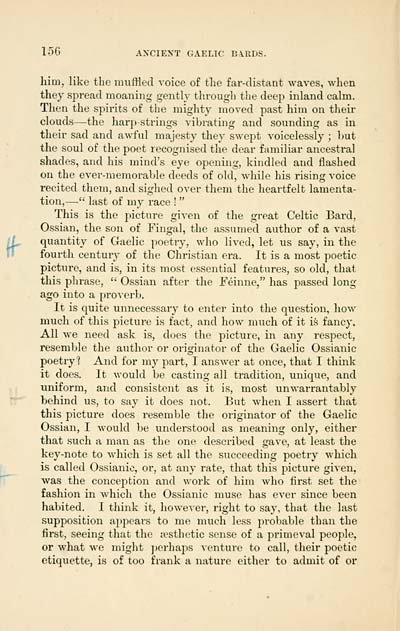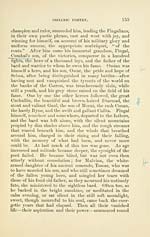Ossian Collection > Gaelic bards
(190)
Download files
Complete book:
Individual page:
Thumbnail gallery: Grid view | List view

156 ANCIENT GAELIC BARDS.
him, like the muffled voice of the far-distant waves, when
they spread moaning gently througli tlie deep inland calm.
Then the spirits of the mighty moved past him on tlieir
clouds — the harp strings vibrating and sounding as in
tlieir sad and awful majesty they swept voicelessly ; l)ut
the soul of the poet recognised the dear familiar ancestral
shades, and his mind's eye opening, kindled and flashed
on the ever-memorable deeds of old, while his rising voice
recited them, and sighed over them the heartfelt lamenta-
tion, — " last of my race ! "
This is the j)icture given of the great Celtic Bard,
Ossian, the son of Fingal, the assumed author of a vast
quantity of Gaelic poetry, who lived, let us say, in the
fourth century of the Christian era. It is a most poetic
picture, and is, in its most essential features, so old, that
this phrase, " Ossian after the Feinne," has passed long
ago into a proverb.
It is quite unnecessary to enter into the question, how
much of this picture is fact, and how much of it is fancy.
All we need ask is, does the picture, in any respect,
resemble the author or originator of the Gaelic Ossianic
poetry"? And for my part, I answer at once, that I think
it does. It would be casting all tradition, unique, and
uniform, and consistent as it is, most unwarrantably
behind us, to say it does not. But when I assert that
this picture does resemble the originator of the Gaelic
Ossian, I would be understood as meaning only, either
that such a man as the one described gave, at least the
key-note to which is set all the succeeding poetry which
is called Ossianic, or, at any rate, that this picture given,
was the conception and work of him who first set the
fashion in which the Ossianic muse has ever since been
habited. I think it, however, right to say, that the last
supposition ajipears to me much less probable than the
first, seeing that the aesthetic sense of a primeval people,
or what we might j)erhaps venture to call, their poetic
etiquette, is of too frank a nature either to admit of or
him, like the muffled voice of the far-distant waves, when
they spread moaning gently througli tlie deep inland calm.
Then the spirits of the mighty moved past him on tlieir
clouds — the harp strings vibrating and sounding as in
tlieir sad and awful majesty they swept voicelessly ; l)ut
the soul of the poet recognised the dear familiar ancestral
shades, and his mind's eye opening, kindled and flashed
on the ever-memorable deeds of old, while his rising voice
recited them, and sighed over them the heartfelt lamenta-
tion, — " last of my race ! "
This is the j)icture given of the great Celtic Bard,
Ossian, the son of Fingal, the assumed author of a vast
quantity of Gaelic poetry, who lived, let us say, in the
fourth century of the Christian era. It is a most poetic
picture, and is, in its most essential features, so old, that
this phrase, " Ossian after the Feinne," has passed long
ago into a proverb.
It is quite unnecessary to enter into the question, how
much of this picture is fact, and how much of it is fancy.
All we need ask is, does the picture, in any respect,
resemble the author or originator of the Gaelic Ossianic
poetry"? And for my part, I answer at once, that I think
it does. It would be casting all tradition, unique, and
uniform, and consistent as it is, most unwarrantably
behind us, to say it does not. But when I assert that
this picture does resemble the originator of the Gaelic
Ossian, I would be understood as meaning only, either
that such a man as the one described gave, at least the
key-note to which is set all the succeeding poetry which
is called Ossianic, or, at any rate, that this picture given,
was the conception and work of him who first set the
fashion in which the Ossianic muse has ever since been
habited. I think it, however, right to say, that the last
supposition ajipears to me much less probable than the
first, seeing that the aesthetic sense of a primeval people,
or what we might j)erhaps venture to call, their poetic
etiquette, is of too frank a nature either to admit of or
Set display mode to: Large image | Transcription
Images and transcriptions on this page, including medium image downloads, may be used under the Creative Commons Attribution 4.0 International Licence unless otherwise stated. ![]()
| Early Gaelic Book Collections > Ossian Collection > Gaelic bards > (190) |
|---|
| Permanent URL | https://digital.nls.uk/79281302 |
|---|
| Description | Selected books from the Ossian Collection of 327 volumes, originally assembled by J. Norman Methven of Perth. Different editions and translations of James MacPherson's epic poem 'Ossian', some with a map of the 'Kingdom of Connor'. Also secondary material relating to Ossianic poetry and the Ossian controversy. |
|---|
| Description | Selected items from five 'Special and Named Printed Collections'. Includes books in Gaelic and other Celtic languages, works about the Gaels, their languages, literature, culture and history. |
|---|

